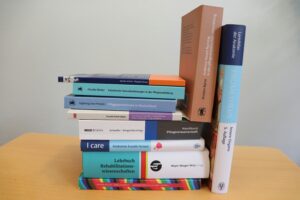
Photo by Julia Taubitz on Unsplash
For Week 2’s readings, David Wiley and Suzan Koseoglu’s posts stood out to me. Wiley’s blog argues that there is an additional R in the 4Rs of Open Education Resources (OER), which is Retain (Wiley, 2014). He explains that the problem with modern day textbooks is that students are usually offered temporary digital access through rentals or subscriptions. In short, students can read textbooks but they can’t keep them, which he believes takes away ownership and therefore power away from them. However, Koseoglu argues that open pedagogy is not just about ownership or technical permissions like the 5Rs (2017). Instead, she views it more as a teaching philosophy rooted in sharing, social justice, and creating inclusive classrooms (Koseoglu, 2020). For her, open pedagogy means inviting students into the learning process and to create an inclusive learning environment, even when OER isn’t involved. Wiley focuses on the tools that make open practices possible, but Koseoglu emphasizes the purpose behind those practices.
I see the value in both perspectives, but I find myself leaning more towards Koseoglu’s. Her framing of open pedagogy as an intentional human-centered practice resonates with me because it places students and their lived experiences at the heart of education. On the other hand, I (respectfully) disagree with parts of Wiley’s post, coming from a current student’s perspective. Wiley explains that giving students and educators should be able to retain content because it gives them control and long-term access to learning resources, even after a course ends. But in my own experience, ownership of textbooks have never felt particularly important, mainly because I often didn’t want the textbooks in the first place. I have dropped certain classes that required me to purchase textbooks because I didn’t want to spend additional money on a course when other courses are capable of offering substantial content without purchasing additional resources. And for the mandatory courses in my program that require textbooks, I don’t think I have ever used or had a desire to use them after the course ended.
This is not to say that I completely disagree with Wiley’s post. I don’t speak on behalf of all students since I know that there are some who have genuine interest in some of the textbooks presented in the class and have gained more value than I did from the resources. I would imagine that they’d agree with Wiley and would love the idea of being able to revisit and have ownership over previous temporarily-accessed readings.
Ultimately this week’s reading helped me reflect on what openness in education should actually serve. I believe learning should feel collaborative, inclusive, and centred on real student needs. In the end, it’s not just about what resources are available or who owns them, but how educators use those resources to build empowering, particapatory learning experiences.
References
Wiley, D. (2014). The Access Compromise and the 5th R. https://opencontent.org/blog/archives/3221
Koseoglu, S. (2020). Open Pedagogy: A Response to David Wiley. Rebus Community. https://press.rebus.community/openatthemargins/chapter/open-pedagogy-a-response-to-david-wiley/
Hi Mandy,
You neatly put Wiley’s “retain” push against Koseoglu’s human-centred vision and then anchor the debate in your own textbook experience—making the theory feel lived-in. The header photo also gives the post an inviting start. A quick spell-check for slips like “creat” and “particpatory,” plus maybe a small 5Rs graphic or pull-quote, would add polish and visual punch to an already informative and engaging blog post.
Thanks for sharing!
Hi Mandy!
Great blog post! I really like the photo at the start; it helped engage me as a reader. I also like how you added your own thoughts and clearly tried to think deeply and critically about this topic. I also love how you added your own experience. This gave the audience the feeling that you truly reflected on the readings and genuinely cared about the topic.
To make this amazing post even better, I suggest hyperlinking the two sources. I like how you included a reference list, but unfortunately, the links don’t work. I also recommend adding some more multimedia elements, such as a video or another photo.
Amazing blog overall!
~Mady